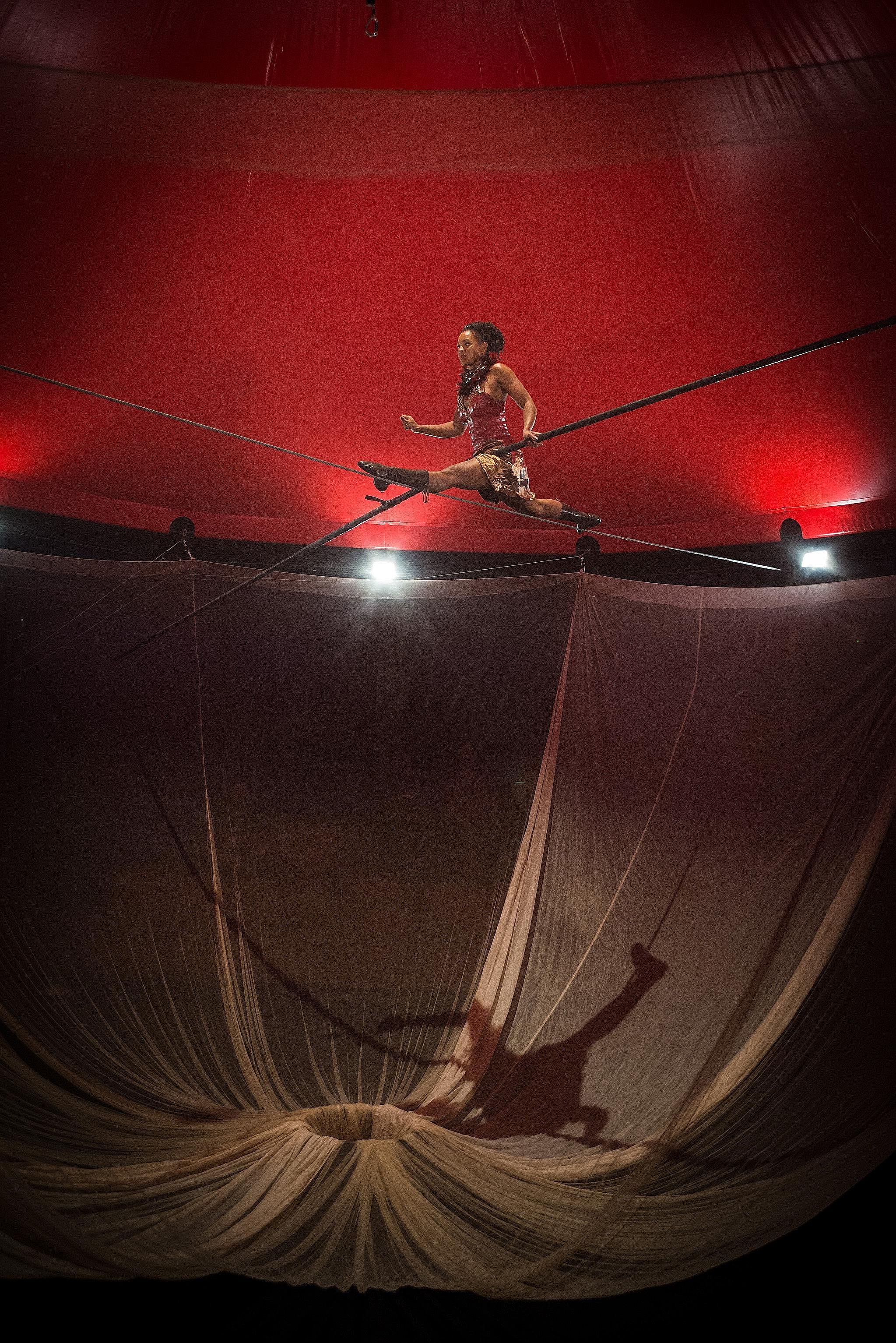REVIEW / THEATRE
CABANONS
Daniel Buren, Fabien Demuynck, Dan Demuynck and BurenCirque
Open field opposite Bugis Junction/Wednesday
Imagine a circus in a big top tent and one might conjure up images of clowns and strongmen, of animals alongside acrobats - or the modernday appeal of Cirque du Soleil with its lavish costumes and crowded setpieces.
French conceptual artist Daniel Buren's Cabanons (French for circus tents) is exactly the opposite.
His small, mobile tents, marked with his signature stripes, often contain only a single performer or two.
These three colourful tents are located on the open field between Bugis Junction and Parkview Square, and the audience moves from one to the next.

In an intimate Buren cabanon, you would be hard-pressed to find a sequin on any of the costumes or "costumes" at all.
Street clothes and practical leotards are the order of the day, whether in a show of aerial silks, acrobatics or the cyr wheel.
The performances are stripped of spectacle, and a performer can look you in the eye and smile, coaxing you into believing that you are the only one in the room and that she is performing just for you.
There is a bond between performer and spectator rarely encountered in a regular circus act.
In one tent, high-wire artist Tatiana Mosto Bongonga, the most beguiling performer of the evening, attaches a series of diaphanous cloths to a set of carabiners.
A single tug on a basic pulley system envelops her in a gauzy bubble. It is practically useless as a safety net and the audience knows it. Watching her glide across the high wire, with a few stunts thrown in, made my palms sweat.
Each tent contains a short series of performances that are lovely to behold. Some have more of an edge of danger than others, but there is no questioning the performers' skill.
They are sometimes accompanied by the haunting strains of the traditional West African plucked-string instrument, the n'goni, played by one of its prominent exponents, Moriba Koita.
Buren intensifes the relationship between audience member and artist with this up-close-and-personal feel.
But his postmodern circus still bears the hallmarks of the 18th-century circus as a cabinet of exotic curiosities.
-
BOOK IT/CABANONS
-
WHERE: Open field opposite Bugis Junction at Tan Quee Lan Street
WHEN: Until Sunday, 8pm
ADMISSION: $80 from Sistic (excludes booking fee; call 6348-5555 or go to www.sistic.com.sg)
INFO: sifa.sg
Most of the performers come from - or come from a heritage of - countries that were once colonised by the French, be they Mali or Cambodia (which has its own acrobat- heavy circus tradition).
There are suggestions of exoticism in some performances, which make a point of showcasing traditional outfits and music.
This might have been a coincidence. But this performance installation left a strange aftertaste.
It sometimes felt like a cultural sampler platter, with a handful of highlights from other lands and some "ethnic" music thrown in for good measure.
This does not take away from the impeccable artistry of all involved, but the shades of cultural imperialism remain.
Despite its problematic un-PC flavour, Cabanons still has its magic touch. Perhaps the idea is not to think of the production as a theatrical experience but as a series of lightboxes where artworks are exhibited, each beautiful and delicate in its own right.
Each tent houses a gruelling test of physical strength and dexterity, and in every act, the performer emerges triumphant.
Hardly any words are exchanged, and it is in those quiet, heart-pounding moments that Cabanons is at its best.
- Follow Corrie Tan on Twitter @CorrieTan

